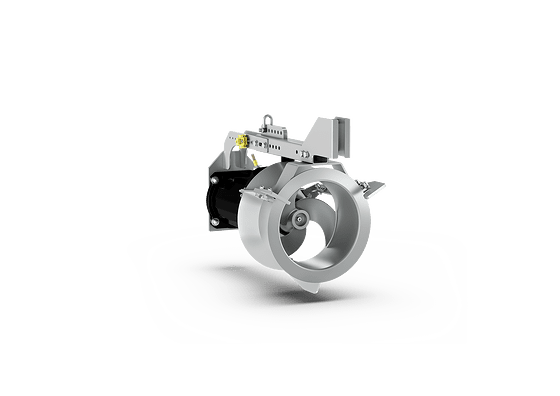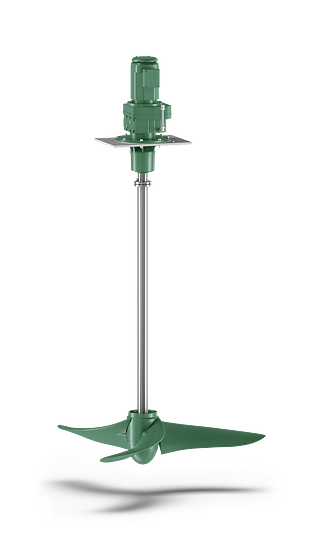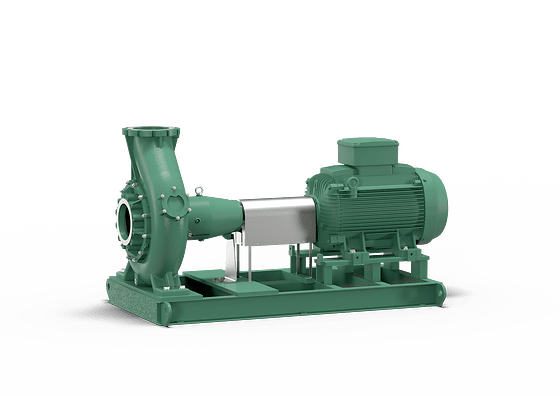
Exceed environmental requirements with efficient systems for a future-proof wastewater treatment plant!
Ready for the next level of sewage treatment? The steadily increasing requirements for water quality and operational reliability necessitate reliable machine technology for wastewater treatment plants.
Wilo offers sustainable and particularly efficient solutions for the effective removal of micropollutants from water – for optimal water quality! Their adaptable design makes them incredibly easy to install. Furthermore, their digital data sets (BIM) allow them to be perfectly integrated from as early as the concept phase. For example, a combination of powdered activated carbon (PAC) and effective separation technologies can be used to eliminate not only micropollutants but also antibiotic-resistant bacteria.
For us, future-proof water treatment also means maximum energy efficiency. In this way, we lower your energy costs in addition to reducing your carbon footprint with efficient machine technology. Optimise your processes – don’t just meet environmental requirements, exceed them!
Ensure effective sewage treatment – by integrating a membrane filter
Our membrane filters can be integrated into existing activated sludge tanks as a membrane bioreactor (MBR). Our membrane bioreactors guarantee efficient filtering of bacteria (including antibiotic-resistant bacteria) and viruses. Combined with the addition of powdered activated carbon, the system effectively adsorbs and removes micropollutants. The membrane’s ultrafiltration spores guarantee 100% retention of ultra-fine activated carbon and microplastics. In this way, wastewater treatment systems can be easily retrofitted and expanded in existing spaces. The robust design and substance-to-substance welded membrane make for a particularly long service life. Enjoy sustainable water treatment and micropollutant removal when you choose our membrane filtration from Marton Systems.
Learn more at Abionik – A Wilo companyEnsure improved sediment performance – with innovative separation geometry
The diagonally inclined lamella separator filters fine particles in water in addition to effectively removing previously added powdered activated carbon, significantly reducing the necessary secondary treatment volume. The fixed and diagonally arranged lamellae make for a large settling surface, reducing the surface load and increasing sediment performance. The powdered activated carbon loaded with micropollutants is deposited between the plates without any additional energy input. With its expandable modular system, the diagonally inclined lamella separator is a compact, environmentally friendly and energy-efficient solution!
Learn more at Abionik – A Wilo companyEnsure reliable sewage transport – even during micropollutant removal.
The new, highly efficient Wilo-Flumen OPTI-RZP and Wilo-Flumen EXCEL-RZPE series ensure reliable continuous operation in a non-clog design. The Wilo recirculation pumps are configured taking into account the customer-specific requirements, existing pipe diameters and necessary volume flows. Installation can also be carried out on existing piping by means of specific connections and settings on the flow housing. The use of stainless-steel investment-cast propellers makes the Wilo-Flumen OPTI-RZP and Wilo-Flumen EXCEL-RZPE ideally suited for continuous operation, and their modular design makes them service-friendly.
Find out more nowChoose operational reliability and flexibility – as a dry installation in the pump chamber
As a stationary dry installation in wastewater treatment plants, the Wilo-Rexa BLOC ensures reliable sewage transport and micropollutant removal. The compact sewage pump with an IEC standard motor as a monobloc unit is available for both horizontal and vertical installation. The IE3/IE4 energy efficiency class ensures that our standard motors operate very economically, including during continuous operation. Reliable sewage pumping operation is technically ensured by proven hydraulics with a vortex or a single-channel impeller. The back-pull-out design lowers maintenance costs and with them operating expenses.
Make a difference and save up to 16 tonnes of CO2.
Read our focus paper to learn more about our solution for micropollutant removal in wastewater treatment systems with upstream denitrification.
Click here to download the focus paper now and deepen your knowledge.Discover how harmful micropollutants come to contaminate sewage and how our products and technologies can effectively help you with micropollutant removal.
Other efficient products for your wastewater treatment plant:
-

Wilo-Flumen EXCEL-RZPE 20 ... 40
-

Wilo-Vardo WEEDLESS-VM
-

Wilo-Rexa NORM
FAQ – Frequently asked questions about micropollutant removal:
What does “micropollutant removal” mean in the context of sewage treatment?
Sewage is treated in municipal wastewater treatment plants using mechanical, biological and chemical processes. After treatment, however, many micropollutants such as pharmaceutical residues, hormones and pesticides are still present that cannot be completely removed. Micropollutant removal describes an additional process to eliminate these micropollutants and conserve natural bodies of water by preventing micropollutants from entering them.
How does micropollutant removal work? And which technologies are used?
Micropollutant removal is a process for cleansing sewage of micropollutants that cannot be removed by municipal wastewater treatment plants. Various technologies are used, such as ozone treatment or activated carbon filtration, or a combination of processes. Ozone treatment involves treating sewage with ozone to oxidise micropollutants and modify them to neutralise their harmful effects.
Activated carbon adsorbs micropollutants to remove them from sewage.
A distinction is made between powdered activated carbon (PAC), which can be added in a contact tank, and granular activated carbon (GAC), which flows through a fixed-bed reactor and adsorbs the pollutants. In the case of PAC, the fine activated carbon has to be removed from the system again later. Combined with membrane bioreactors, this is a very efficient method: The membrane filters completely retain the superfine PAC particles loaded with micropollutants, while the water is filtered through the membrane. This combination of processes also makes it possible to remove antibiotic-resistant bacteria and micro- and nanoplastics almost completely.
The goal of micropollutant removal is to remove harmful micropollutants from the water cycle to prevent them from contaminating the environment. After cleaning, the sewage has a very high quality, making it suitable for reuse in industry or agriculture, for example. Micropollutant removal is an important contributor to environmental protection and sustainable water usage.
What micropollutants can be removed during sewage treatment?
What are the effects of micropollutants on the environment and on human and animal health?
Sewage can contain micropollutants from a variety of sources, most of which are of human origin. Even at low concentrations, they can be harmful to the environment and human health. Micropollutants can accumulate not only in bodies of water and the soil, but also in organisms, which introduces them to the food chain, resulting in the potential for long-term harm. Certain micropollutants are harmful to both human and animal health, as they can affect an organism’s hormone balance or even have carcinogenic and toxic effects. Sewage and water treatment are therefore important measures to remove micropollutants from sewage and thus protect the environment and human and animal health. Micropollutant removal in the context of sewage treatment is an important contributor to the elimination of micropollutants and to sustainable water usage.
We have answers to your questions
Our products and services have aroused your interest? Then we are happy to help!
Whether it's creating an offer or editing service specifications, designing different types of equipment, advising on the selection of pumps and switchgear, or just helping with hydraulic and control issues.
Feel free to contact your nearest sales office and make an appointment. We look forward to hearing from you!
Find the right contact for your question.









